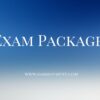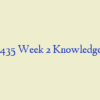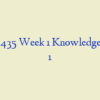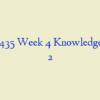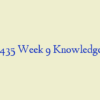Description
NSG 6435 Final Exam Study Guide 3 with Answers
- A congenital heart abnormality often discovered during the newborn period is coarctation of the aorta. How is this assessed?
- A child who can stack a maximum of 5 blocks is probably:
- A 6 yr old child who has moderate persistent asthma is diagnosed with pneumonia after chest x-ray and lab studies. He developed a sudden onset of fever with chills. He is in no distress. What is the preferred treatment for him?
- A healthy appearing 3-yr old female presents with non-blanchable redness over both knees and elbows. During the exam, she is found to have normal growth and development, and she interacts appropriately with the NP. She had an upper respiratory infection about 4 wks ago that cleared without incident. A CBC and UA were obtained. The most likely diagnosis is:
- An adolescent has acne. The NP prescribed a benzoyl peroxide product for him. What important teaching point should be given to this adolescent regarding the benzoyl peroxide?
- a 6-wk old male infant is brought to the NP because of vomiting. The mother describes vomiting after feeding and feeling a knot in his abdomen especially after he vomits. The child appears adequately nourished. What is the likely etiology?
- Which suggestion below is the standard for treating iron deficiency anemia in infants and children?
- A young child has developed a circumferential lesion on her inner forearm. It is slightly raised, red and is puritic. It is about 2.5 cm in diameter. This is probably related to:
- A 7-yr old entered clinic 1 month ago. There was no evidence that he had any immunizations. He was given the vaccinations listed on his vaccination record at the time of his visit. if he returns today, which immunizations can he receive?
- What would be appropriate anticipatory guidance for the parent of a 9-month old infant?
- An infant is diagnosed with diaper dermatitis. Satelite lesions are visible. This should be treated with a:
- The NP sees a child who reports fatigue and presents with purpura on his lower extremities. His temperature is normal. The differential includes:
- Genetics
Nutrition
Prenatal/ environmental factors
Family/ community
Cultural factors - Nutrition
- Height, Skin, Hair, Eye color
- Growth
- Development
- Teratogen
- Autocratic
- Patriarchal
- Matriarchal
- Democratic
- Nuclear family
- Social contract and cohabitation
- 25.Single parent family
- Blended ( reconstituted)
- Erick Erickson
- Sigmond Freud
- 29.Jean Piaget
- Extended family
- Homosexual
- Adoptive
- Gradfamilies
- Foster
- Basic trust v mistrust
- Autonomy v shame and doubt
- Initiative v guilt
- Industry v inferiority
- Identity v role confusion
- Intimacy v isolation
- Generativity v stagnation
- Ego integrity v despair
- Mood swings
- male- Tanner stage I
- 45.Male-Tanner stage 4
- earliest age child able to copy triangle, know colors and count on fingers
- earliest age avg child would appropriately receive paper and scissors with rounded points
- usual age for vision screening
- female Tanner stage 4
- Female – Tanner stage 5
- 14 yr old male- acute painless swelling of groin. which tool will yield the most info
- Age of precocious puberty
- avg age of pubertal growth spurt in american boys
- Female – Tanner stage II
- 12 yr old male, hip pain w/ activitiy, worsening, involves knee, no trauma, ?In office eval?
- Trendelenburg test used to id
- what age should oral health risk assessment begin?
- 4 yr child not allergic to chickens but allergic to duck feathers, immunizations contraindicated?
- child can walk backwards
- child can stand on one foot
- Can stack 5 blocks
- child can stack 3 blocks
- Positive support reflex ceases after
- In school aged child (6-12)___considered tachycardia
- Normal heart rate 60-100 after age
- Male-First sign of sexual maturation
- Male- average age of sexual maturation
- delayed puberty
- Most common cause of delayed puberty
- to eval for hip dysplasia
- 6mo male-palpable cystic mass in scrotum, size varies
- 6 mo- disconjugate gaze- tilts head when looking at object
- Should be avoided in ITP
- Intussception can follow?
- NOT a sign of congenital hypothyroidism
- Adolescent -wt loss, chronic diarrhea, anemia, weakness
- Describe the s/s of small and large VSDs
- Acynotic heart murmur d/t increased pulmonary flow
- Pauciarthritis (most common subgroup of juvi-idiopathic arthritis)
- side effects of ADHD meds
- Parents/guardian of adolescents should receive health guidance
- Age of onset of irritable bowel disease
- characteristics of infant with bronchopulmonary dysplasia
- child with insulin pump is more likely to experience
- palpable thrill in L upper sternal border
- Which heart defect produces a systolic ejection click at the upper left sternal border with a thrill palpated at the upper left sternal border?
- sit before standing is example of
- Maternal iron stores are depleted by
- In adolescents with IBD, it is important to monitor
- What are important thing to monitor in patient taking corticosteroids to control inflammation in IBD?
- treatment for Atypical pneumonia
- Best tools for treating adolescents
- The adolescent growth spurt is triggered by
- Best way to screen for gonorrhea – FEMALE
- Best way to screen for gonorrhea – MALE
- HPV screening in female
- Newborns of diabetic mothers are at risk for
- gardasil results in greater antibody response for adolescents who receive 3 dose series between ages
- VISION OF 2 YR OLD
- 13 yr old pt with bone maturity of 10 yrs
- treatment for delayed puberty
- Mother voices concern with 3 yr old stuttering
- Eating disorders
- Common symptom of ASD (anterior septal defect)
- Biomedical issues that may create academic performance issues
- Bipolar disease requires
- Joe, a 13 year old with asthma, developed a runny nose, coughing and wheezing on expiration. Joe takes Flovent 2 puffs BID. You would suggest he:
- Janet is a 16 year old with moderate persistant asthma. She takes Advair discus 250/50 one inhalation BID in her green zone.
- Which of the following medications would be most appropriate to intensify her controller therapy for yellow zone treatment?
- •When completing Beth’s physical exam which would be inconsistent with a dx of asthma?
- •Beth is a 12 year old with suspected asthma. Which of following findings in her hx would support this dx?
- ASTHMA
- ASTHMA DDx
- Physical Assessment
- Asthma Clinical Manifestations
- Pulmonary function tests
- Degrees of Asthma
- Mild Persistent Asthma-
- Moderate Persistent/Severe Asthma
- Diagnose asthma
- O2 Sats
- Therapeutic Mgmt
- Asthma not controlled if:
- Rescue medications
- Anticholinergics
- Inhaled Corticosteroids
- Inhalers by age group
- LABA long acting B2 Adrenergic Agonists
- Which of the following asthma medications contains a blackbox warning for usage in regards to increased risk of asthma-related deaths
- Long acting medications
- Metered dose inhaler – AGE?
- Aerochamber MDI
- Status Asthmaticus
- Otitis Externa
- OE pathogens
- Otitis externa RX TX
- Acute Otitis Media- Prevalence/incidence
- Pathogen Acute Otits Media
- AOM physical exam
- Eustachian Tube
- Tympanic Membrane
- Diagnose AOM Physical exam
- OM with Effusion TX?
- 1st line Tx AOM
- AOM tx failure next?
- Risk factors of Acute Otitis Media include_____, ______ and ____________.
- Conductive Hearing loss
- Conductive hearing loss Physical Exam- Weber-
- Rinne-
- causes of SensoriNeural inner ear causes
- Sensori Neural loss Weber Rinne
- Hordeoleum
- Management: Hordeolum
- DDx Hordeolum
- Chalazion
- Blepharitis
- chalazion mgmt
- Conjuctivitis- RED EYE
- Conjunctivitis
- Viral conjuctivitis
- Allergic Conjunctivitis
- Gonococcal conjunctivitis
- Rx Bacterial Conjuctivitis
- PeriOrbital Cellulitis
- Orbital Cellulitis Tx
- MISCELLANEOUS AIRWAY CONSIDERATIONS IN KIDS
- Pediatric airway
- Childs airway is the size of a _____.
- Childs airway is _____ & ______
- Infants breath thru _______
- Ped Respiratroy Assessment
- Wet diapers/stools a day
- Common cold
- Sx, PE, DDx
- Complications of the common cold
- Pharyngitis
- Bacterial Pharyngitis
- Group A Strep
- Bacterial Pharyngitis Ddx
- Pharyngitis Ddx<3years
- >6years
- GAS Rx
- Allergic Rhinnitis-MGMT RX
- Sinusitis xrays? CT?
- Treat Sinusitis
- Croup- Steeple sign nsg 6435 final exam
- Laryngitis, Laryngotrachetis, Laryngotracheobronchitis, Bacterial tracheitis, Spasmodit croup, croup-Viral, Bacterial causes
- Croup most common in ages______
- Epiglottitis
- Bacterial Pneumonia Rx less than 5
- Bacterial Pneumo greater than 5 years
- TB Sx
- Bacterial Pneumo Hospitialize when?
- Epstein Barr Virus (MONO)
- Epstein-Barr virus (mono)
- Mono S/Sx
- Mono Mgmt
- Polio vaccine given @
- Parents ask the NP why their baby will receive an IM polio injection instead of the oral vaccine. The best response would be:
- Tetanus DTap
- whooping cough
- Hemophilis Influenzae
- Meningeal signs– tests
- Enterovirus- types, routes, incubation shedding
- Herpangina, Hand foot mouth
- Herpangina
- What causes Hand-Foot-Mouth disease?
- Coxsackie A virus
- Erythema Infectiosum-Fifth Disease
- Erythema Infectiosum (fifth disease)
- 5ths disease Stage1 and 2
- fifths disease Tx Management nsg 6435 final exam
- ¨The nurse is educating parents re: fifth disease. What explanation takes priority?
- Lyme dz Tx Rx
- Kawasaki disease (KD)
- ¨Leading cause of Acquired heart disease in children?
- Kawasaki disease stage 1
- Kawasaki Dz stage 2 and 3
- Hand swelling
- Kawasaki dz Diagnosis
- Kawasaki rash
- nonexudative conjuctivitis
- strawberry tongue nsg 6435 final exam
- A 3 year old with KD is admitted to the hospital for fever. The nurse knows that the following tx will be started to shorten the fever and decrease the risk of complications?
- High dose ASA therapy
- IV antibiotics
- IV steroids
- IVIG

